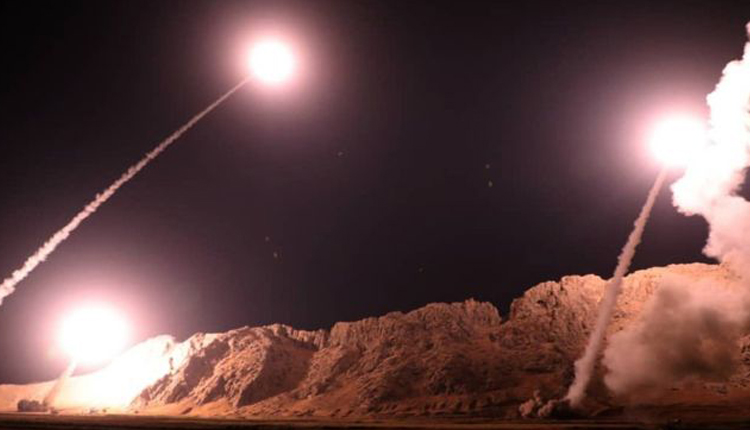Iran said it fired missiles on Monday at Islamic State militants in Syria it blames for an attack on its soil on Sept. 22 and said the action shows the government’s readiness to punish the “wickedness” of its enemies.
Tehran has accused U.S.-backed Gulf Arab states of attacking a military parade in southwestern Iran and killing 25 people, nearly half of them members of the elite Revolutionary Guards.
Monday’s strike targeted the bases of “takfiri terrorists” backed by Washington and regional powers in eastern Syria, the Guards said in a statement on Sepah News, their news site. It killed a number of militant leaders and destroyed their supplies and infrastructure, they said.
Iranian officials often use the word “takfiri” to describe Sunni Muslim hardliners. Iran is predominantly Shi’ite Muslim.
“Death to the family of Saud,” “Death to America,” and “Death to Israel” were written on one of the missiles shown on the Fars News site.
The strike targeted the last pocket of territory in southeastern Syria held by Islamic State, said an official in the Iran-backed regional alliance fighting in support of Syrian President Bashar al-Assad.
It is an area where the U.S.-backed Syrian Democratic Forces (SDF) launched a new offensive last month against Islamic State.
The U.S.-led coalition confirmed Iranian forces had conducted “no notice strikes last night”.
“At this time, the coalition is still assessing if any damage occurred and no coalition forces were in danger,” Col. spokesman Sean Ryan said.
“IRON FIST”
Fars News posted video footage of several missiles streaking into a dark sky during the attack.
The six ballistic missiles used in the attack flew 570 km (354 miles) to hit the targets, the Guards said. A map shown on state TV pinpointed Kermanshah in western Iran as the launch site and Albu Kamal in southeast Syria as the target.
The missiles were Iranian-made Zolfaqar and Qiam missiles, Fars News reported.
“Our iron fist is prepared to deliver a decisive and crushing response to any wickedness and mischief of the enemies,” the Guards, the most powerful military force in the Islamic Republic, said.
Seven drones were also used to bomb militant targets during the attack, they said.
The Ahvaz National Resistance, an Iranian ethnic Arab separatist movement, and the Islamic State have both claimed responsibility for the Sept. 22 attack. Neither group has presented conclusive evidence to back up its claim.
“The terrorists used bullets and we gave them a reply with missiles,” Fars News quoted Brigadier General Amirali Hajizadeh, head of the Guards’ airspace division, as saying.
“The security of the Iranian people is our red line and we will not be found wanting.”
A senior Revolutionary Guards commander said on Monday that Islamic State militants in Syria’s Deir al-Zor province had helped coordinate the parade attack.
These Islamic State militants were the target of the missile strike, said Major General Mohammad Baqeri, the armed forces chief of staff, according to Fars News.
“The area east of the Euphrates where Islamic State is based is under the control of the American military and the Guards’ missiles hit an area that is close to the area under American control,” Baqeri said.
He added, “All of these are a warning for the enemies so they don’t move toward creating insecurity in Iran.”
Iranian military support has been vital to helping Assad through the Syrian war, and Iran-backed forces are deployed in southeastern Syria on the west bank of the Euphrates River. Iran has dismissed U.S. demands that it leave Syria.
The official in the Iran-backed alliance described Monday’s strike, targeting an area on the eastern bank of the Euphrates, as a “limited message”. “One of the messages, to those it concerns, is that ‘our missiles are one of our powerful cards that are ready to respond whenever we want’,” the official said.
Supreme Leader Ayatollah Ali Khamenei, the highest authority in Iran, has said the militants responsible for the Sept 22 attack were paid by Saudi Arabia and the United Arab Emirates and that Iran would “severely punish” those behind the violence.
Saudi Arabia and the UAE have denied involvement in the attack.
Mohsen Rezaie, a former commander of the Guards, suggested in a Twitter message on Monday that more attacks were coming.
“The main punishment is on the way,” Rezaie, who is secretary of the Expediency Council, an unelected arbitration body that resolves disputes between parliament and a clerical vetting body, the Guardian Council, wrote.
Last year, the Guards fired missiles at Islamic State militants in Syria after the group claimed responsibility for an attack on the parliament in Tehran and the mausoleum of the founder of Iran’s revolution, Ayatollah Ruhollah Khomeini, that left at least 18 people dead and dozens wounded.
source: Reuters


